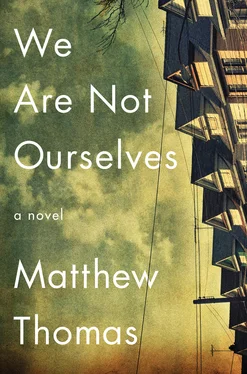“Mrs. Leary?”
Of course it was the husband, and not the wife, who recognized her, because her perpetual industry allowed him a clear head, and she barely had a brain left at the end of a day of housework. Eileen felt herself straighten up in respectful solidarity.
“Mrs. Leary, from whom we bought the house,” he added.
Her hand went to her mouth to stifle the sound of her shock. “Oh! Welcome! What brings you here?”
“I was in the neighborhood.”
“Forgive me, I’m a mess.” She gestured to the apron tied around her waist, a prominent, fresh stain on its front. “Vijay, please take Mrs. Leary’s jacket.” So that was the boy’s name. It had taken the wife’s entrance for this crucial detail to emerge. Thomas Thomas could have been Ed standing there in a somehow still-charming dereliction of protocol. The boy came over and helped the jacket off Eileen’s shoulders one at a time. “May I show you around?” the woman asked. “I’m sure you’re curious to see the house.”
Eileen was curious. She was so refreshed to behold how accurate the woman— Anabel —had been in her perception, how sensitive to nuance, that she almost didn’t answer right away.
“I would love to see it,” she said. “My name is Eileen.”
Their shake was firm, appreciative — collegial. Anabel led her to the kitchen, which smelled like cardamom and curry. They had turned it into a galley kitchen. There was much more counter space now. They had granite slabs, not unlike the ones in her house. There was even a space to eat, with bar stools pushed under it, but she could tell they ate their meals in the dining room. The renovations were tastefully done, the sort she would have approved of had she and Ed committed the money to making them — had she not known in the back of her mind that she was thinking of some other house every time she looked at her own. Anabel gave her a quick tour. They had redone the bathroom: new tiles, a new clawfoot tub, a beautiful pedestal sink. They had converted one of the closets in the master bedroom into a little bathroom. She’d always wished for an extra bathroom on that floor, so she wouldn’t have to walk down to the basement when someone else was using it. New baseboard molding lined the house. Everywhere were elements obviously Indian — silk tapestries, carved wood figurines, an enameled brass vase — but there were also crosses on the walls, and a picture of the pope in the master bedroom. It took her a moment to register that this had once been her bedroom with Ed. Nothing in it looked the same. The bed seemed to radiate the life and energy of years of a couple sleeping side by side in it.
“How are your husband and son?”
She didn’t have it in her at that moment to deflect the question in an obfuscating ramble. “My husband died last March,” she said.
“Oh! I’m so sorry! Mrs. Leary!”
“Thank you,” she said. “And please call me Eileen.”
“It must be strange to be back here.”
“It’s nice, actually.”
“Please stay for dinner. We’re just about to eat.”
She knew what to say when politeness was extended in the due course of decency: I have to get going or I really can’t stay , whatever made it easier for everyone to save face and return to their regular lives. But she didn’t want to say any of that right now. She was so very tired. She wanted to stay there with these people in the attractive home they’d made of what she’d left behind. Something about these environs struck her as oppressively and irreducibly different, and yet she could imagine never leaving them. She didn’t look forward to returning to her empty house, with the wind screaming, the branches shushing against the siding, and the fear of someone creeping in through the window troubling her sleep. So much life filled this home that there was no way to feel dread in it, but then she’d seen that there was no way to feel dread in anyone’s home but one’s own. Something was sacred in being a guest.
She was led to the dining room table and directed to sit. Thomas and Vijay shut the television off and made their way to the table with murmuring contentedness in their voices.
“Do you like Indian food?” Thomas asked, breaking the spell as Anabel slipped into the kitchen. Eileen froze in terror. She’d sat already, had begun to arrange her napkin in her lap, so there was no way out. The last thing she wanted was to act discourteously to these people, but the truth was that she hated Indian food, hated the very sight of it — its little lakes of earth-toned sauces, its hillocks of meat in blasted landscapes of mud. She had smelled the spices but thought of them as an inevitable detail — a tribal marker, not part of the daily routine. She had somehow failed to consider that the Thomases actually made Indian food at home. Wasn’t the way forward to assimilate? She didn’t know how to read these people who blended in but didn’t, who were like her but weren’t, whose kids got where her own kid got, or even beyond, but started somewhere else entirely.
How could she say she hated their food? She would have to explain everything — how she’d come to feel about the neighborhood, about her life, about the world as she’d wanted it to be: simple, predictable, familiar. It wasn’t about their food. It was the smell, the spices, the strangely proliferating condiments, the mystery of its preparation. It was the fact that she’d had no choice about it. So many Indians were there all of a sudden and so many of her friends were gone. At some point all the restaurants in the neighborhood had become Indian restaurants. Then the last of her friends had left, and the Indian restaurants had remained and seemed to multiply. She couldn’t stand the sight of the stuff, and now she was about to be served it.
“I don’t know,” she said. “I’ve never had it.”
And that, finally, was the truth. For all her revulsion, for all the times she’d insisted she couldn’t take a single bite without gagging, she’d never actually tasted it. It had been easier to say she had, because there had been less to explain. It had been easier to say, “I don’t like it,” instead of, “I’m too angry to try it.” But you couldn’t lie to yourself forever.
Her throat was constricted and dry. She took a long drink of water, almost the entire glass.
“You’re in for a treat,” Thomas said upon the entrance of his wife bearing platters. He listed names of dishes; Eileen was too keyed up to register them. He spooned out a plate for her as Vijay passed her a bowl filled with bread that resembled thin, soft mattresses. After she had her plate, the others filled theirs in turn, and the scent wafting up at her was not as offensive as she’d imagined it would be; there was a sweet pungency to it. The mound on her plate was the color of Mars. There was no turning back.
Thomas said the name of the dish again, and she speared some on her fork. As she bit into it, she registered that it was chicken, and also that there was tomato in the sauce, and cream of some sort, as well as some indeterminate spices. There was something complex and contradictory about it, a mildness and a stoutness that competed for primacy, and on top of these a pleasing fullness in the mouth, the medley of textures bolstered by stray grains of rice. She was aware of how she had no competing memory with which to dull the vibrancy of this experience. If to taste forgotten foods was to reanimate the past, then a different kind of reminder, a reminder of future possibility, waited in unfamiliar flavors. She was making a new memory. She was eating Indian food. She’d never thought she’d live to see the day.
“It’s good,” she said, trying to be measured, until she couldn’t hold back. “It’s really very good.” She placed her fork on her plate, straightened up in surprise, and saw them looking at her warmly. It was only then that she registered that they were sitting in the same arrangement she and Ed and Connell had sat in in that room — the father nestled into the table’s head, his back to the window, the boy with his back to the mirror, the wife across from him, ready to shuttle dishes. Eileen was in the seat that had often gone empty at her own table. She’d looked at it in the middle of meals and thought how nice it would be to have someone drop in unannounced and bring the world to her. She’d never imagined the scene from the visitor’s vantage point, how complete a picture of life it might have presented, how much it might have looked as if everything that mattered in the world was there already.
Читать дальше
Конец ознакомительного отрывка
Купить книгу












